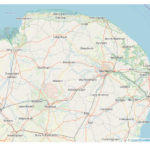Dickimaw Books Blog 
Alternative History 🔗
[Originally posted on Goodreads 2018-04-17.] I mentioned my pending novel The Fourth Protectorate in my earlier Crime and SF blog post. I also spoke briefly about it during Keith Skipper’s July 2017 monthly mardle in Radio Norfolk’s Matthew Gudgin’s Teatime Show. For those who are interested, here’s a little more information about the novel’s genre.
The Fourth Protectorate is an alternative history with supernatural elements, but what actually is alternative history? It’s sometimes referred to as a ‘what if?’ genre. What if something happened in the past that caused subsequent events to diverge from real life? That something is the point of departure, and the subsequent events form an alternate timeline (or history). I think the most well-known (but not the earliest) alternative history story is probably Philip K. Dick’s The Man in the High Castle (first published in 1962). The point of departure in that case was the different outcome of an attempt to assassinate US President Franklin D. Roosevelt. In real life, Giuseppe Zangara tried to shoot Roosevelt in February 1933. The premise of The Man in the High Castle is what if Zangara had succeeded? In real life, Roosevelt felt so strongly about supporting the Allies during WWII that he broke tradition and stood for a third term. The alternative timeline has Roosevelt replaced by an isolationist who keeps the USA out of the war, which changes the outcome.
The ‘what if so-and-so died at an earlier point in time?’ premise is a common point of departure. The reverse ‘what if so-and-so didn’t die?’ is also used (to comic effect with Red Dwarf and rather more seriously with Star Trek: The Original Series). Other points of departure can be somewhat vaguer, such as ‘what if a battle was lost instead of won?’ (as with Len Deighton’s SS-GB, where the Battle of Britain was lost), or the point of departure can be something seemingly trivial (‘for want of a nail’).
In the case of The Fourth Protectorate, which is set from 1984 to 1995, the principle point of departure is the Brighton Bomb. What if it had killed the Prime Minister and the entire Cabinet? The event occurs in the chapter that’s rather unimaginatively called ‘Point of Departure’, and you can accept that as the actual point of departure if you like but, whilst thinking about the exact differences between the alternative timeline of the story and real life, I came to the conclusion that the real point of departure occurs earlier, but the differences are much subtler until 1984 is reached. So what actually causes the divergence?
In the world of The Fourth Protectorate, the supernatural exists, although most people aren’t aware of it, but there’s a constant conflict between good and evil. One side is trying to make the world a better place and the other is trying to ruin it. Both sides have some ability to predict future events, but neither side can interfere with free will. They can, however, plant suggestions in people’s minds to influence outcomes. People are free to choose to follow or ignore those suggestions, but those who have a natural predisposition towards the suggestion or those who have a weak will are more likely to comply. So when is the actual point of departure?
What if during the Blitz a bomb toggle was operated a fraction later? A minor suggestion planted in the airman’s mind that causes a momentary delay. The dispersal pattern changes, a different set of buildings are destroyed and a different set of people die. The global outcome is unchanged, but minor deviations start to occur that can lead up to a bomb or some people being in a slightly different location a few decades later. It may also have led to more significant changes. The Prime Minister and other ministers are never named in the book, so they may not be the same as in our real timeline.
So the principle point of departure is the ‘what if so-and-so died?’ type but the actual point of departure is a seemingly insignificant change that had a knock-on effect. This conveniently means that any minor discrepancies from real life at the start of the book now have an explanation (such as the reason why famous/infamous people who lived in that region in real life don’t appear to exist in the story).
One of the interesting things I’ve encountered while writing the novel is the background research to refresh my memory of the 1980s (and the previous decade). It’s reminded me of just how volatile that era was. There were definitely a lot of ‘what if?’ moments.
Next Post
 I had an interesting encounter with a couple of children as I was heading back into the village after walking around the muddy footpaths and byways around the area.
I had an interesting encounter with a couple of children as I was heading back into the village after walking around the muddy footpaths and byways around the area.Previous Post
Recent Posts
 There are a growing number of digital historians who are interested in documenting old computing systems from the twentieth century, but much of the information has been lost and coincident names can make it hard to search. This article is about the RISC OS ARMTeX distribution, which provided TeX and LaTeX for the ARM-powered Acorn computers in the 1990s.
There are a growing number of digital historians who are interested in documenting old computing systems from the twentieth century, but much of the information has been lost and coincident names can make it hard to search. This article is about the RISC OS ARMTeX distribution, which provided TeX and LaTeX for the ARM-powered Acorn computers in the 1990s. The DRM-free ebook retailer SmashWords has its annual Summer/Winter sale from 1st – 31st July 2025. My crime novel “The Private Enemy” and children’s illustrated story “The Foolish Hedgehog” both have a 50% discount, and my crime fiction short stories “I’ve Heard the Mermaid Sing”, “Unsocial Media”, “Smile for the Camera”, and “The Briefcase” have a 100% discount (i.e. free!) for the duration of the sale. Did you know that you can gift ebooks on SmashWords?
The DRM-free ebook retailer SmashWords has its annual Summer/Winter sale from 1st – 31st July 2025. My crime novel “The Private Enemy” and children’s illustrated story “The Foolish Hedgehog” both have a 50% discount, and my crime fiction short stories “I’ve Heard the Mermaid Sing”, “Unsocial Media”, “Smile for the Camera”, and “The Briefcase” have a 100% discount (i.e. free!) for the duration of the sale. Did you know that you can gift ebooks on SmashWords? If you have read my short story Smile for the Camera, did you notice that the ending could have two possible interpretations? (No spoilers please!) As a writer, it’s always difficult to tell if something is too obvious or too obscure. If you need a hint, consider the naming scheme and remember that not everyone is what they say or imply that they are.
If you have read my short story Smile for the Camera, did you notice that the ending could have two possible interpretations? (No spoilers please!) As a writer, it’s always difficult to tell if something is too obvious or too obscure. If you need a hint, consider the naming scheme and remember that not everyone is what they say or imply that they are. The Ex-Cathedra writing group were delighted to present a cheque for £1,400 to St Martins Housing Trust during their collection at Tesco Harford Bridge on 6th December 2024. The money was raised from sales of the book Tales for Our Times, an anthology of short stories written by the group. The cheque was received by Ian Hanwell on behalf of St Martins. Many thanks to the support of everyone who purchased a copy and to the staff at Tesco Harford Bridge for allowing us to make the presentation there.
The Ex-Cathedra writing group were delighted to present a cheque for £1,400 to St Martins Housing Trust during their collection at Tesco Harford Bridge on 6th December 2024. The money was raised from sales of the book Tales for Our Times, an anthology of short stories written by the group. The cheque was received by Ian Hanwell on behalf of St Martins. Many thanks to the support of everyone who purchased a copy and to the staff at Tesco Harford Bridge for allowing us to make the presentation there. Search Blog
📂 Categories
- Autism
- Books
- Children’s Illustrated Fiction
- Illustrated fiction for young children: The Foolish Hedgehog and Quack, Quack, Quack. Give My Hat Back!
- Creative Writing
- The art of writing fiction, inspiration and themes.
- Crime Fiction
- The crime fiction category covers the crime novels The Private Enemy and The Fourth Protectorate and also the crime short stories I’ve Heard the Mermaid Sing and I’ve Heard the Mermaid Sing.
- Fiction
- Fiction books and other stories.
- Language
- Natural languages including regional dialects.
- (La)TeX
- The TeX typesetting system in general or the LaTeX format in particular.
- Music
- Norfolk
- This category is about the county of Norfolk in East Anglia (the eastern bulgy bit of England). It’s where The Private Enemy is set and is also where the author lives.
- RISC OS
- An operating system created by Acorn Computers in the late 1980s and 1990s.
- Security
- Site
- Information about the Dickimaw Books site.
- Software
- Open source software written by Nicola Talbot, which usually has some connection to (La)TeX.
- Speculative Fiction
- The speculative fiction category includes the novel The Private Enemy (set in the future), the alternative history novel The Fourth Protectorate, and the fantasy novel Muirgealia.
🔖 Tags
- Account
- Alternative History
- Sub-genre of speculative fiction, alternative history is “what if?” fiction.
- book samples
- Bots
- Conservation of Detail
- A part of the creative writing process, conservation of detail essentially means that only significant information should be added to a work of fiction.
- Cookies
- Information about the site cookies.
- Dialect
- Regional dialects, in particular the Norfolk dialect.
- Docker
- Education
- The education system.
- Ex-Cathedra
- A Norfolk-based writing group.
- Fantasy
- Sub-genre of speculative fiction involving magical elements.
- File formats
- FlowframTk
- A vector graphics application written in Java that can export to pgf picture drawing code but can also be used to construct frames for use with the flowfram package. Home page: dickimaw-books.com/software/flowframtk. (FlowframTk was originally called JpgfDraw.)
- Hippochette
- A pochette (pocket violin) with a hippo headpiece.
- History
- I’ve Heard the Mermaid Sing
- A crime fiction short story (available as an ebook) set in the late 1920s on the RMS Aquitania. See the story’s main page for further details.
- Inspirations
- The little things that inspired the author’s stories.
- Linux
- Migration
- Posts about the website migration.
- Muirgealia
- A fantasy novel. See the book’s main page for further details.
- News
- Notifications
- Online Store
- Posts about the Dickimaw Books store.
- Quack, Quack, Quack. Give My Hat Back!
- Information about the illustrated children’s book. See the book’s main page for further details.
- Re-published
- Articles that were previously published elsewhere and reproduced on this blog in order to collect them all together in one place.
- Sale
- Posts about sales that are running or are pending at the time of the post.
- Site settings
- Information about the site settings.
- Smile for the Camera
- A cybercrime short story about CCTV operator monitoring a store’s self-service tills who sees too much information.
- Story creation
- The process of creating stories.
- TeX Live
- The Briefcase
- A crime fiction short story (available as an ebook). See the story’s main page for further details.
- The Foolish Hedgehog
- Information about the illustrated children’s book. See the book’s main page for further details.
- The Fourth Protectorate
- Alternative history novel set in 1980s/90s London. See the book’s main page for further details.
- The Private Enemy
- A crime/speculative fiction novel set in a future Norfolk run by gangsters. See the book’s main page for further details.
- Unsocial Media
- A cybercrime fiction short story (available as an ebook). See the story’s main page for further details.
- World Book Day
- World Book Day (UK and Ireland) is an annual charity event held in the United Kingdom and the Republic of Ireland on the first Thursday in March. It’s a local version of the global UNESCO World Book Day.
- World Homeless Day
- World Homeless Day is marked every year on 10 October to draw attention to the needs of people experiencing homelessness.


